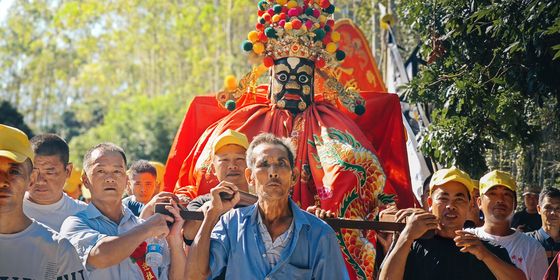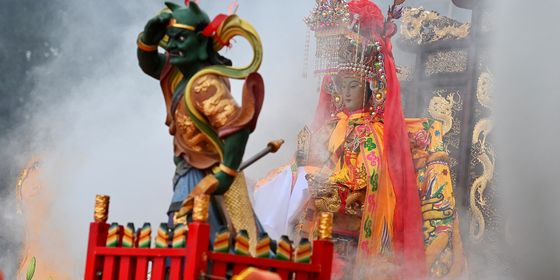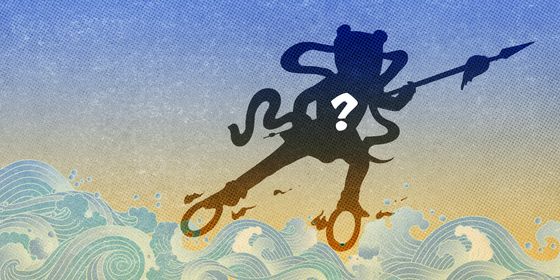Pointing at the moon? Sharing pears? Four common Chinese superstitions explained
News of a Shanghai kindergartener left at the wrong school by his uncle prompted some to joke the boy ought to exact revenge on his careless relative by getting a haircut next Spring Festival, traditionally believed to be a fatal curse upon one’s mother’s brothers.
Growing up in the countryside, I was “instructed” by relatives and other elders with various dos and don’ts, which I generally obeyed, despite sometimes wondering whether there was a shred of truth to them. Looking back, I’ve been able to discover possible origins for the some of the strangest folk beliefs in rural China.
1. Same, same but different
Pronunciation plays an important role in the formation of many superstitions. The curse on the uncle, for example, comes from the custom of keeping one’s shorn locks as a keepsake after an important haircut, or 思旧 (sījiù, “cherishing the old”), a homophone for “uncle death” in Chinese.
Homophones are also the reason why Chinese like certain numbers and dislike others, and explain some gift-giving taboos. For example, a clock is usually an unwelcome present for superstitious Chinese, as 钟 (zhōng, clock) sounds like 终 (zhōng, ending), while 送终 (sòng zhōng) refers to the practice of attending a parent or senior relative at their deathbed or funeral. Presenting a clock (送钟, sòng zhōng), therefore, is bad news.
Pears (梨, lí) are also verboten: The fruit sound like “departure” in Chinese, and it’s especially not tactful to present them to sick friends and relatives. A pear is also not supposed to be shared between friends or couples, because “sharing a pear” (分梨, fēn lí) sounds exactly like “separation” (分离). Shoes are another taboo gift, since 鞋 (xié) has the same pronunciation as 邪 (“evil spirit”).
2. Less said, the better
Any Chinese learner knows that just learning the characters and tones aren’t enough: In China’s high-context culture, knowing what to say, hint, and avoid on different occasions is its own art, especially when government “officialese” is involved.
It’s a common superstition in China that one should not say bad things out loud, especially for topic related to illness or death. For example, saying “I haven’t had a cold in a long time” is a sure-fire way to make yourself sick. When visiting friends and relatives from afar, especially during Spring Festival, one should not say, “I won’t be able to come next year” or “I don’t know when I’ll be able to come again,” as this foreshadows some debilitating illness or death.
Generally, people in rural areas are more cautious about saying “no” or “not” (不, bù) during the Spring Festival. For example, when children leave the table after the lunar New Year’s Eve banquet, they are taught to say “I’m full and leaving the food for next year” instead of “I can’t eat any more.”
3. Don’t tempt fate
One shouldn’t just avoid saying bad things: Being overly effusive with praise can also be construed as inviting a jinx on someone. For example, when visiting a newborn baby in a rural area, it’s best not to call it “well-behaved,” “cute,” or any other positive traits. It is believed that babies are instinctively naughty and will get spoiled by these compliments.
In some regions, while attending the 满月酒 (Full Month Wine) banquet to celebrate a baby’s one-month birth, visitors will often say “you naughty boy” or “look at the ugly girl” as a “compliment.” With this custom deeply rooted in my mind, I often find it awkward when meeting friends with new babies.
4. One thing leads to the other
Many rural superstitions are rooted in the belief that all things in the universe are connected—though oftentimes, you really have to strain to see the connection.
As a child, I was told not to eat chicken feet, or I would develop bad handwriting. What’s the connection? Well, chickens certainly cannot hold a pen well with their feet. On the other hand, chicken feet are also traditionally served to the family breadwinner at banquets, because this may help them earn more money. (This practice continues till today in my family)
There are many other rules for youngsters. For example, children are instructed not to hold an open umbrella indoors, because the roof and umbrella will act as some form of “double pressure” that will prevent them from growing tall. When children lose their baby teeth, senior family members tell them to throw the lower teeth under the bed, and upper teeth on the tile roof. In this way, the new lower teeth will grow upward and upper teeth downward.
However, there are still some superstitions even I can’t make head or tail of. For example, children are told not to point their fingers at the crescent moon, or the back of their ear will hurt the next morning. Is it because the crescent moon looks like the blade of a sickle? No one is sure. What’s more: One night I tried pointing at a crescent moon, and a cut appeared behind my ears.












